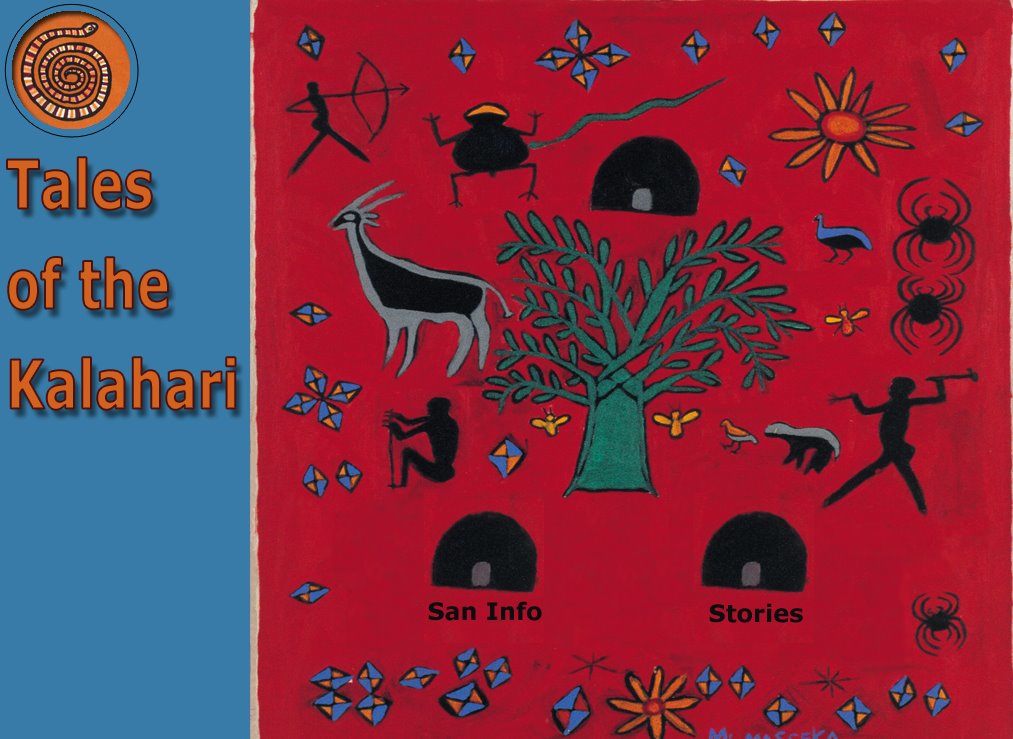|
Six months since conceiving the idea of publishing ancient San tales in electronic form, I have a prototype digital app (or is it an e-book/anthology? To be discussed…) loaded onto my iPad. Next week I will present the prototype to San trainees gathered at !Khwa ttu, a San cultural and educational centre 70kms from Cape Town.
Here I hope to get an idea of whether this sample of younger San, think transforming their traditional folktales into digital form and disseminating them to readers in the computer-literate world, is a good idea. If they do, we can begin growing this project together. It might seem strange to be talking about the latest in high-end technology and narratology to a people who are newly literate and mostly live beyond the electricity grid, people who have little chance of acquiring, let alone charging a smart phone. Also, of the 11 click language groups in southern Africa, only four, to the best of my knowledge, have an orthography. Given all the above, plus issue of literacy, chances are that the majority of San are not regular computer users. Isn’t it bizarre then, to say nothing of insensitive, to be thinking of making the folktales available on tablet readers and state-of-the-art phones? Since my attendance at a workshop series last year called “Documenting Now, the Story of our Lives” , arranged by the Kalahari People’s Network, I’ve come to believe that the Internet is a place for the San to represent themselves to the world without having to directly confront its challenges. If they can make a bit of money for the coffers of their representative organizations by selling e-books to curious first-worlders, while also gaining some transferable skills for themselves (audio-visual production, professional writing and digital marketing) might this not benefit San communities and individuals? And once the project is funded and working, the folktales could be adapted and used by San children short of resources in their mother tongues, in village schools in the Kalahari. I'm optimistic about mobile learning. Some excellent research has been done to facilitate communication among rural communities. Okay, so we sell the e-book/app to first-worlders and the San kids get ‘em free. But what if there isn’t a large market for the stories? Will it mean the project has failed if what it produces is not commercially viable? No. In this event, at the very least, the project will leave a digital legacy of the extraordinary San folktales. In an era when the San hunter-gathering lifestyle and cultural practices are becoming a distant memory, this might be important. And, if the tales can be told in various San languages, the e-anthology might foster the preservation of certain click-languages. As Wade Davis, who rejoices in the job title of National Geographic Explorer–in-Residence says in his book Wayfinders: Why Ancient Wisdom Matters in the Modern World: “A language… is not merely a set of grammatical rules or vocabulary. It is a flash of the human spirit, a vehicle by which the soul of each particular culture comes into the material world. Every language is an old-growth forest of the mind… an ecosystem of spiritual possibilities. (2009: 3) I’m pleased to say that the project concept, at least, has piqued the interest of various organizations working for and with the San — the facilitators at !Khwa ttu, for example, where storytelling has been a theme this past year. The current exhibition at the centre is titled: "Once Upon a Time is NOW: San Stories and Survival. Then there’s film-maker, Richard Wicksteed, whose latest documentary, Bushman Odyssey, charts the journey of a family of displaced Khomani bushmen desperate to return to their traditional land in the Kgalagadi National Park in South Africa. (Thanks to a successful crowd-funding call this film will soon be complete. It will be poignant viewing, I think, given the recent death of the film’s protagonist, Dawid Kruiper, a well-known San rights activist. ) I'm thrilled that Richard Wicksteed has offered training to San interested in audio-visual production. Finally, several San scholars have expressed support for the project too; more about their thoughts on it later. For now, I’d like to establish San opinion. I’m encouraged by feedback from a new San friend, Tomsen Nore, who writes: “The project would ensure the survival of San ancient stories in the wake of rapid technological advancement and development. Post modern man walking around with ancient San folktale in a handset… so amazing.”
8 Comments
|
AuthorAfrican novelist and out-to-grass, academic. Archives
January 2024
Categories
All
|

 RSS Feed
RSS Feed